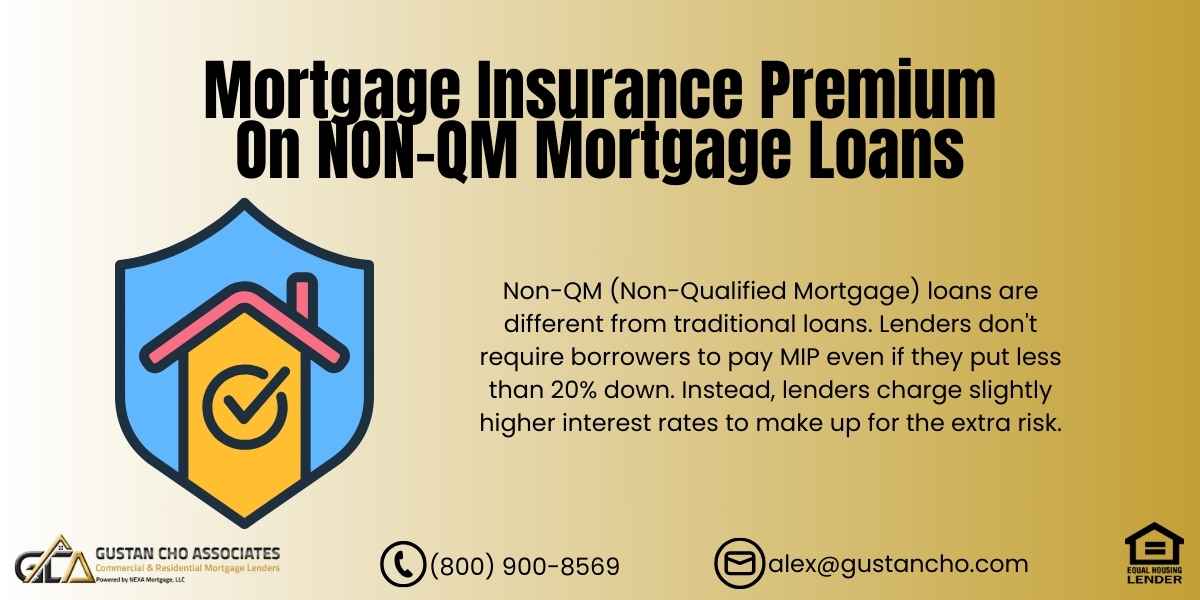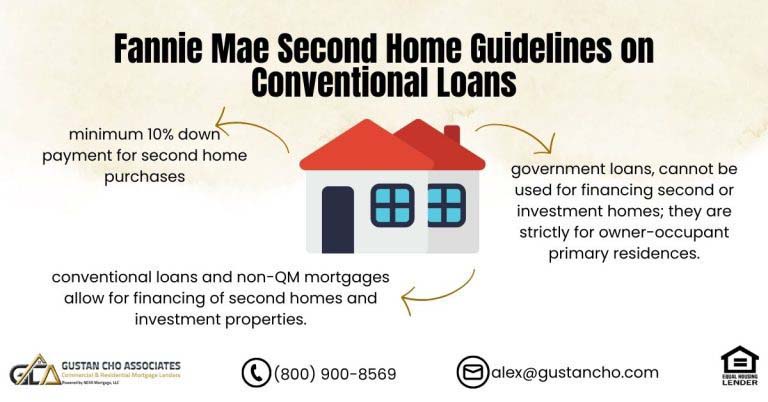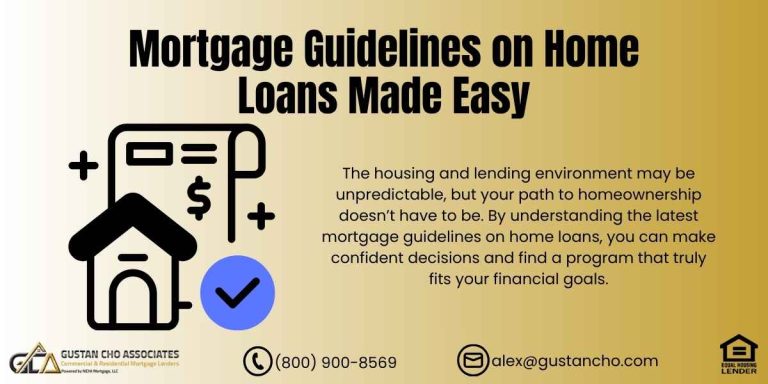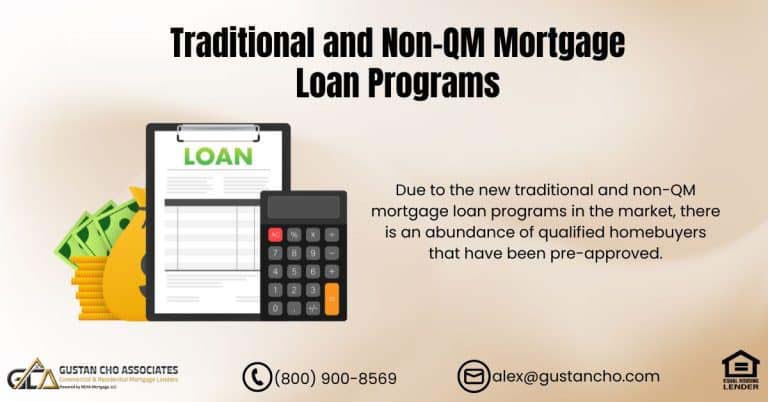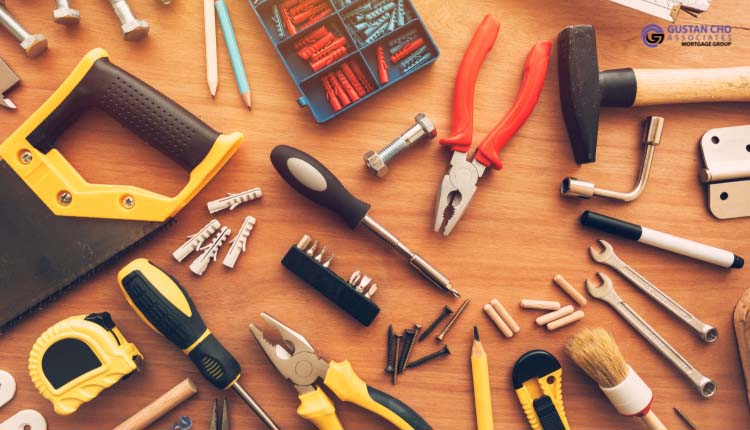Mortgage Insurance Premium on Non-QM Mortgage Loans: What You Need to Know
When buying a home, mortgage insurance premium often pop up, especially if you’re putting down less than 20%. But what about non-QM mortgage loans? Do you still have to pay a mortgage insurance premium if you’re going non-QM? In this guide, we’ll break it down for you in simple terms. We’ll also show you how Gustan Cho Associates can help you get the best non-QM mortgage without worrying about extra insurance costs.
What Is a Mortgage Insurance Premium?
A mortgage insurance premium (MIP) is a safety net for the lender if you stop making your mortgage payments. It doesn’t help you out as the borrower. MIP is usually found on government-backed loans, like FHA, VA, and USDA. When it comes to regular loans, it’s often called private mortgage insurance (PMI).
If you put down less than 20% on a conventional loan, you usually have to pay PMI until your loan balance drops to 80% of the home’s value. FHA loans require MIP for the life of the loan unless you refinance.
Do You Have to Pay Mortgage Insurance Premium on Non-QM Loans?
Good news: No mortgage insurance premium is required on non-QM loans!
Non-QM (Non-Qualified Mortgage) loans are different from traditional loans. Lenders don’t require borrowers to pay MIP even if they put less than 20% down. Instead, lenders charge slightly higher interest rates to make up for the extra risk.
At Gustan Cho Associates, we specialize in non-QM loans with no mortgage insurance premium, making homeownership more affordable for buyers who don’t fit traditional loan guidelines.
Looking for a Mortgage That Doesn’t Fit Traditional Guidelines?
Non-QM loans offer flexible options for borrowers with unique financial situations. Contact us today to find out how a non-QM loan can work for you.
Why Non-QM Loans Don’t Require Mortgage Insurance
Non-QM lenders recognize that these loans can be a bit riskier. Instead of requiring you to get mortgage insurance, they have other ways to protect themselves, such as charging higher interest rates, asking for larger down payments (usually between 10% and 20%), and looking for borrowers with stronger profiles like higher credit scores or bigger savings. Because of this approach, there’s no need for a mortgage insurance premium, which makes your monthly payment simpler and cleaner without that extra MIP cost.
Private Mortgage Insurance: How it Works on Conventional Loans (Quick Overview)
If you were getting a traditional conventional loan, here’s what would happen:
- Less than 20% down = PMI required
- PMI stays until you reach 80% loan-to-value
- You can cancel PMI once you have enough equity
On an FHA loan, MIP is mandatory for the life of the loan unless you refinance into a conventional loan. Even if your home value skyrockets, you still pay MIP.
But again, with non-QM loans, you skip this step altogether. No mortgage insurance premium at all.
Benefits of No Mortgage Insurance Premium on Non-QM Loans
When you don’t have to pay a mortgage insurance premium, you get a lot of perks:
- Lower monthly payment: Without MIP, you save hundreds of dollars monthly.
- Simplified closing: One less thing to worry about when finalizing your loan.
- More flexibility: You can qualify for a loan even after bankruptcy, foreclosure, or with alternative income, such as bank statements.
- Faster homeownership: No waiting until you save 20% for a down payment.
At Gustan Cho Associates, we help you take full advantage of these benefits with our range of non-QM mortgage options.
Down Payment Requirements on Non-QM Loans
Even though there’s no mortgage insurance premium, non-QM loans do require a higher down payment:
- Minimum 10% down for borrowers with strong credit scores
- 15% to 20% down if your credit is lower or if you have recent credit issues
Your down payment amount will depend on factors such as your credit score, how you prove your income, and the type of property you’re looking at.
Mortgage Insurance Premiums and Bank Statement Loans
Bank statement loans are one type of non-QM loan made for self-employed borrowers. Like other non-QM loans, they do not require a mortgage insurance premium.
With a bank statement loan, you qualify using your deposits instead of tax returns or W2s. This solution is perfect for business owners, freelancers, and gig workers.
At Gustan Cho Associates, we offer 12-month and 24-month bank statement mortgage programs with no MIP required.
How Risk Is Managed Without Mortgage Insurance Premium
You might wonder, “If there’s no mortgage insurance premium, how do lenders protect themselves?”
Here’s how:
- Higher rates: Rates on non-QM loans are about 1% to 2% higher than those on conventional loans.
- Bigger reserves: Lenders may require you to show 6-12 months of housing payments saved up.
- Better property types: Non-QM lenders prefer traditional single-family homes and condos.
Because of these precautions, lenders feel safe offering no-MIP loans to a wider range of borrowers.
Can You Cancel Mortgage Insurance on Non-QM Loans?
Since non-QM loans never require mortgage insurance premiums, there’s nothing to cancel! You won’t have to worry about refinancing to get rid of MIP. You start clean from Day 1 with no extra insurance cost on your payment.
That means you keep more money in your pocket every month.
Other Ways to Avoid Mortgage Insurance Premium
If you’re looking at all your options, here are other loan programs without MIP:
- VA Loans (for veterans): No MIP ever, even with 0% down.
- 80/10/10 Piggyback Loans: First mortgage at 80%, second mortgage at 10%, 10% down payment.
- Lender Paid Mortgage Insurance (LPMI): Higher interest rate but no separate PMI bill.
Still, for many buyers who don’t qualify for these, non-QM loans are the best way to avoid the mortgage insurance premium while buying a home.
Who Should Consider a Non-QM Loan Without MIP?
You might want a non-QM mortgage if:
- You’re self-employed and write off a lot of expenses
- You had a recent bankruptcy, short sale, or foreclosure
- You’re a real estate investor
- You have non-traditional income (like 1099 work, cash jobs, or big bonuses)
- You want to qualify with bank statements instead of tax returns
At Gustan Cho Associates, we work with borrowers like you every day to find the right non-QM loan solution without the burden of mortgage insurance.
Why Choose Gustan Cho Associates for Your Non-QM Mortgage?
When you work with Gustan Cho Associates, you get the following:
- Expert advice: We understand non-QM loans better than anyone.
- Flexible programs: Bank statement loans, DSCR loans, asset depletion loans, and more.
- Fast closings: We close loans in 21 days or less.
- No overlays: We follow agency guidelines, not extra rules like big banks.
- 7-day availability: Nights, weekends, and holidays — we’re here when you need us.
We’re passionate about helping you become a homeowner without the stress of extra mortgage insurance premiums dragging you down.
Need a Mortgage But Don’t Meet Standard Guidelines?
Non-QM loans can help you get the financing you need, even if you don’t qualify for traditional loans. Reach out now to learn more about your non-QM loan options.
Final Thoughts: Skip the Mortgage Insurance Premium with a Non-QM Loan
If you’re looking for a flexible mortgage with no mortgage insurance premium, non-QM loans are an incredible option. You can get into a home faster, with fewer roadblocks and a lower monthly payment.
At Gustan Cho Associates, we’re here to guide you every step of the way. Whether you’re self-employed, had a recent financial bump, or want more flexibility, we have the needed non-QM loan options.
Ready to buy a home without worrying about mortgage insurance? Call us at 800-900-8569, text us for a faster response, or email us at gcho@gustancho.com. We’re available 7 days a week, evenings, weekends, and holidays.
Let’s make your dream home a reality without the extra cost of a mortgage insurance premium.
Frequently Asked Questions About Mortgage Insurance Premium on Non-QM Loan:
Q: Do I have to Pay a Mortgage Insurance Premium on a Non-QM Loan?
A: No, you don’t! Non-QM loans do not require a mortgage insurance premium, even if you put less than 20% down.
Q: Why don’t Non-QM Loans Require Mortgage Insurance?
A: Non-QM lenders charge slightly higher interest rates and may ask for bigger down payments instead of making you pay for mortgage insurance.
Q: What is a Mortgage Insurance Premium Anyway?
A: It’s insurance you pay to protect the lender if you stop making payments. It doesn’t help you as the borrower.
Q: Is a Higher Down Payment Needed on Non-QM Loans Without Mortgage Insurance?
A: Yes. Most non-QM loans require at least 10% down, and sometimes up to 20%, depending on your credit and situation.
Q: Will My Monthly Payment be Lower Without a Mortgage Insurance Premium?
A: Yes! Even though the rate might be slightly higher, skipping mortgage insurance usually means a cheaper monthly payment.
Q: Can I Cancel Mortgage Insurance Later on a Non-QM Loan?
A: There’s nothing to cancel because non-QM loans don’t have mortgage insurance to begin with.
Q: Do Bank Statement Loans have Mortgage Insurance Premiums?
A: No. Bank statement loans, a type of non-QM loan for self-employed people, also do not require mortgage insurance.
Q: What if I had a Foreclosure or Bankruptcy? Can I Still Get a Non-QM loan Without Mortgage Insurance?
A: Yes! Non-QM loans are great for buyers with recent credit issues, and you still won’t need to pay mortgage insurance.
Q: Besides Non-QM Loans, What are Other Ways to Avoid Mortgage Insurance Premiums?
A: If you’re a veteran, you can get a VA loan, do an 80/10/10 piggyback loan, or choose lender-paid mortgage insurance (LPMI) on a conventional loan.
Q: How can Gustan Cho Associates Help Me Get a non-QM loan with no Mortgage Insurance Premium?
A: We offer flexible non-QM programs, fast closings, expert advice, and we support seven days a week!
This blog about “Mortgage Insurance Premium On NON-QM Mortgage Loans” was updated on April 29th, 2025.
Ready to Apply for a Non-QM Loan? We Can Help!
Non-QM loans offer solutions for borrowers with unique circumstances. Get in touch today to find out how we can help you secure financing.


